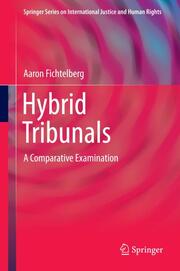Detailansicht
Hybrid Tribunals
A Comparative Examination, Springer Series on International Justice and Human Rights
ISBN/EAN: 9781461466383
Umbreit-Nr.: 4396370
Sprache:
Englisch
Umfang: xviii, 206 S.
Format in cm: 1.7 x 24.3 x 16.3
Einband:
gebundenes Buch
Erschienen am 11.06.2015
Auflage: 1/2015
- Zusatztext
- This book examines hybrid tribunals created in Sierra Leone, Kosovo, Cambodia, East Timor, and Lebanon, in terms of their origins (the political and social forces that led to their creation), the legal regimes that they used, their various institutional structures, and the challenges that they faced during their operations. Through this study, the author looks at both their successes and their shortcomings, and presents recommendations for the formation of future hybrid tribunals.Hybrid tribunals are a form of the international justice where the judicial responsibility is shared between the international community and the local state where they function. These tribunals represent an important bridge between traditional international courts like the International Criminal Court (ICC), the International Criminal Tribunal for the Former Yugoslavia (ICTY), the International Criminal Tribunal for Rwanda (ICTR) and various local justice systems. Because hybrid tribunals are developed in response to large-scale atrocities, these courts are properly considered part of the international criminal justice system. This feature gives hybrid tribunals the accountability and legitimacy often lost in local justice systems; however, by including regional courtroom procedures and personnel, they are integrated into the local justice system in a way that allows a society to deal with its criminals on its own terms, at least in part.This unique volume combines historical and legal analyses of these hybrid tribunals, placing them within a larger historical, political, and legal context. It will be of interest to researchers in Criminal Justice, International Studies, International Law, and related fields.
- Kurztext
- This book examines hybrid tribunals created in Sierra Leone, Kosovo, Cambodia, East Timor, and Lebanon, in terms of their origins (the political and social forces that led to their creation), the legal regimes that they used, their various institutional structures, and the challenges that they faced during their operations. Through this study, the author looks at both their successes and their shortcomings, and presents recommendations for the formation of future hybrid tribunals. Hybrid tribunals are a form of the international justice where the judicial responsibility is shared between the international community and the local state where they function. These tribunals represent an important bridge between traditional international courts like the International Criminal Court (ICC), the International Criminal Tribunal for the Former Yugoslavia (ICTY), the International Criminal Tribunal for Rwanda (ICTR) and various local justice systems. Because hybrid tribunals are developed in response to large-scale atrocities, these courts are properly considered part of the international criminal justice system. This feature gives hybrid tribunals the accountability and legitimacy often lost in local justice systems; however, by including regional courtroom procedures and personnel, they are integrated into the local justice system in a way that allows a society to deal with its criminals on its own terms, at least in part. This unique volume combines historical and legal analyses of these hybrid tribunals, placing them within a larger historical, political, and legal context. It will be of interest to researchers in Criminal Justice, International Studies, International Law, and related fields.
- Autorenportrait
- InhaltsangabeIntroduction: Hybrid Tribunals in International Justice.- I: Forming the Hybrid Tribunals.- Sierra Leone: Civil War and Justice.- Kosovo: International and Hybrid Justice.- Cambodia: Justice (long) After the Fact.- East Timor: Genocide and Colonialism.- Lebanon: Assassination of Rafic Hariri and Global Justice.- II: Structuring the Tribunals.- Sierra Leone.- Kosovo.- Cambodia.- East Timor.- Lebanon.- III: The Tribunals in Action.- Sierra Leone: Taylor and "The Other".- Cambodia and Lebanon: Fighting for Independence.- Kosovo and East Timor: Working in the UN System.- IV: Conclusions: Evaluating the Tribunals.- Hybrid Tribunals and Local Justice.- Hybrid Tribunals and International Justice Revisited.- Guidelines for Future Tribunals.
